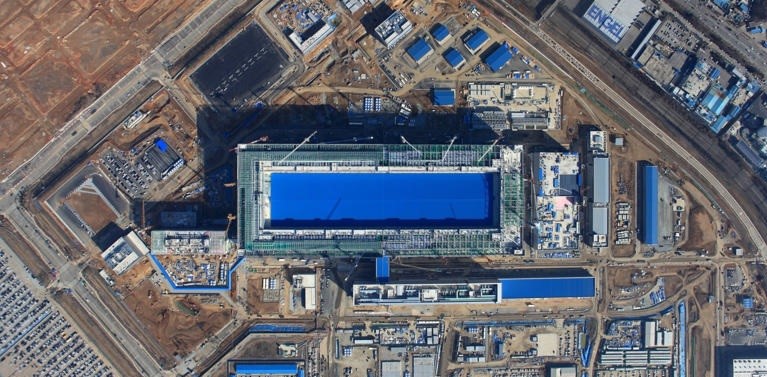In the turbulent market wave of the semiconductor industry, Samsung Electronics' wafer foundry business has recently ushered in a major turnaround. According to a report by South Korea's "Asia Daily" on February 13, 2025, Samsung Electronics' foundry (semiconductor contract production) business unit has lifted the "shutdown" state of production equipment, and plans to increase the operation rate of the wafer foundry production line in Pyeongtaek campus (P) to the highest level as soon as June this year, and the key driver behind this is the surge in orders from China.
Market background: the reversal of the shortage of orders to the soaring production capacity
In the past year, the global semiconductor market has experienced a downturn, and Samsung Electronics' foundry business has not been spared. Due to the sluggish orders, Samsung Electronics' foundry business unit implemented "shutdown" measures to save costs, resulting in the suspension of about 50% of the 4nm, 5nm and 7nm foundry equipment at the P2 and P3 factories in Pyeongtaek Park. However, with the gradual improvement of the market environment, especially the surge in orders from China, Samsung's foundry business has ushered in a bright moment.
According to industry insiders, the resumption of operation is due to the increase in orders related to the smartphone application processor (AP) Exynos of Samsung Electronics' system LSI business unit and the expansion of orders for China's cryptocurrency "mining machines". The strong demand in the Chinese market has not only alleviated the order shortage of Samsung's foundry business, but also brought new opportunities for it to soar production capacity. At present, the business unit has gradually lifted the shutdown of some production lines, so that most of the equipment that was interrupted during the shutdown is back into production.

Pictured: Samsung's foundry Pyeongtaek campus
Technical details: the help of advanced manufacturing process and high-bandwidth memory
1 The production capacity of advanced process technology is restored
Samsung's P2 and P3 factories in Pyeongtaek mainly produce 4nm, 5nm and 7nm foundry equipment, which have important applications in high-performance computing and smartphone applications. With the recovery of the smartphone market and the growth of high-performance computing demand, Samsung's advanced process technology has ushered in new market opportunities. With this resumption of production, Samsung will make full use of these advanced process technologies to meet the market demand for high-performance chips.
2 Order growth for the sixth generation of high-bandwidth memory (HBM4).
The increase in production orders for "logic chips", the core of the sixth-generation high-bandwidth memory (HBM4), also provides strong support for the overall operation rate of Samsung's foundry business. As a high-performance memory, HBM4 is widely used in artificial intelligence, high-performance computing, and data centers. The increase in production orders for its core logic chips indicates that the market demand for high-performance memory is growing rapidly, which also injects new impetus into the capacity increase of Samsung's foundry business.
Character perspective: insights from industry experts and corporate decision-making
1 The views of industry insiders
Industry insiders pointed out that Samsung's resumption of production this time is due to the increase in orders related to the smartphone application processor Exynos and the expansion of orders for China's cryptocurrency "mining machines". These new orders not only alleviated the order shortage caused by the previous market downturn, but also effectively promoted the recovery of overall production capacity. In addition, the increase in production orders for the core logic chips of the sixth generation of high-bandwidth memory (HBM4) has also injected new impetus into the overall operation rate.
2 Enterprise decision-making
In July 2024, Samsung Electronics suspended the construction of its P4 Phase II (P2) OEM production line in Pyeongtaek Park to build P3 first. At the time, this decision was made in response to the continued deterioration of the foundry business situation. Now, as market demand picks up, Samsung has gradually lifted the shutdown and resumed the operation of most production lines. This decision not only reflects Samsung's rapid response to market changes, but also lays the foundation for future capacity expansion.
The future outlook: opportunities and challenges coexist
1 Market opportunities
The resumption of production marks Samsung's strong return in the semiconductor field and reflects the importance of Chinese market demand in the global supply chain. With the wide application of AI technology in semiconductor manufacturing, the efficiency and product quality of wafer foundry are expected to be further improved in the future. This will win more opportunities for Samsung in the global semiconductor market.
2 Technical challenges
Despite the recovery in market demand, Samsung still faces technical challenges. Especially in terms of advanced process technology, Samsung needs to continuously improve its process level to meet the market demand for high-performance chips. In addition, Samsung also needs to strengthen cooperation with leading semiconductor companies to form a virtuous circle of "receiving orders - process improvement - receiving orders".
3 Industry competition
In the context of fierce competition in the global semiconductor market, Samsung's resumption of production will undoubtedly intensify market competition. Competitors such as TSMC are also increasing their production capacity and technology level, and Samsung needs to continue to make efforts in technological innovation and market expansion to maintain its market position.
Conclusions
Samsung's Pyeongtaek foundry capacity soared to new heights, driven by a surge in orders from China. From the shortage of orders to the recovery of production capacity, Samsung's persistence and innovation in the semiconductor field have been rewarded by the market. However, the road ahead is not all smooth sailing, and Samsung still needs to face the dual pressure of technical challenges and industry competition. But what is certain is that the resumption of production has won new development opportunities for Samsung in the global semiconductor market and injected new vitality into the entire semiconductor industry.






